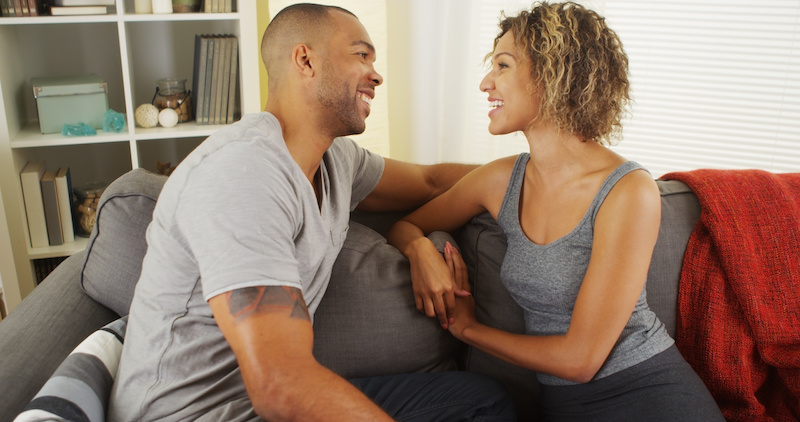Relationship Advice
Operation: Effective Communication
How many times have you heard that communication is the most critical skill for successful relationships? Heck, how many times have I mentioned communication in previous posts? Multiple. Like here and here. And that’s because I believe it to be so fiercely true! As a former terrible communicator in relationships, I have personally seen firsthand the difference it makes in the success of a healthy relationship. But communication as a whole seems so broad. What does communication mean? Does it mean I just need to listen and talk about my feelings? It can be confusing. So, let’s breakdown the Top 10 tips for effective communication in a relationship. In no particular order!
#1: ACTIVELY LISTEN
I feel like this is something we’ve heard since elementary school. “Let’s use our active listening skills girls and boys!” said most teachers, in most places. If you haven’t revisited it since you were six, let’s talk about it.
Active listening means just that: listening, actively! First and foremost, it means giving your full attention. Undivided. Focused on the other person. The “active” part is what most people struggle with. “How do I actively listen? I can’t do that thing where I move my ears back and forth!” You don’t need that gene for this skill thankfully!
The “active” part simply means being ‘seen’ listening. Easy examples of things you can do? Use eye contact! Nod to acknowledge you hear them. Smile! Use verbal cues like “mmhmm” and “oh really?” You are ACTIVELY listening, giving cues to let the other person SEE you listening.
#2: DON’T MAKE ASSUMPTIONS
We know what happens when you assume things…you make an ASS of U and ME! And sometimes in relationships, it’s hard not to make assumptions. It’s one of those things where in a newer relationship where time together and information about each other is limited, you can easily make assumptions. And in a long-standing relationship where a couple has been together for a very long time, it’s also easy to make assumptions because you believe you know everything there is to know about that person. It’s a catch 22!
Even if it’s tough, not making assumptions is key to successful communication. When we make assumptions, we also make up stories in our heads. Most often, the assumptions are wrong and the stories we made up are far off target from the actual situation. For me in relationships, when I’ve been insecure I’ve made assumptions which led me down a spiral of negative thoughts. When I finally communicated with my partner, I realized I was very off base from what was actually going on. What an unnecessary stressor and burden to carry! Not to mention unfair to my partner. Let’s not make asses of ourselves by assuming. Save the ass for the bedroom!
#3: LIMIT DISTRACTIONS
How is that even possible these days you ask? Trust me. I know it’s difficult. You may not be able to limit all distractions, but you can take responsibility for the ones in your control. Easiest thing to do: put your phone down. Out of sight, maybe volume off, depending on the situation. Turn off the TV. Maybe not every single time, but it’s difficult to actively listen if you’re looking at your phone screen or constantly being interrupted by incessant notifications from your group texts. Control what you can control and limit the distractions you can!
#4: MAKE SOME TWO-TIME
No, not the cheating kind. No matter how crazy your schedule, how many back-to-back appointments and events and meetings you have, it’s important to make time for just the two of you. To talk. Breathe. Be together. Whatever! Lose the phones, hold each other’s hands. Have a conversation. It’s difficult to get good at communication if you never do it because your schedule controls you instead of you controlling it. A simple 15 or 30 minutes of just time for the two of you can go a long way to making space for better communication in your relationship.
#5: OWN THE I, LOSE THE YOU
This one can be hard when you start to build this habit. We’re conditioned to want to place blame on someone else for something and not take ownership. This shows up in relationships sometimes by saying “you did this” and “you didn’t do that.” While a person’s actions can undoubtedly impact how we feel, it’s important to focus less on what “they” did and instead communicate more about yourself. Instead of “you didn’t do X the other day and you didn’t do it the last time I asked you either,” reframe it to lose the YOU and own the I. “I felt disrespected and invisible when I asked you to do X and it didn’t get done.” There’s still a YOU in there talking about them, but the focus is on the I. Instead of just stating what they did/didn’t do, put the impact on you in the forefront. It’s a much different way of communicating and a much more effective way of moving forward instead of getting stuck in a blame game situation!
#6: ASK OPEN-ENDED QUESTIONS
I used to work for a company that had a high focus on relationship building and sales. One of the best skills we learned was how to ask open-ended questions. They create better conversations, limit assumptions (see tip #2), and make us better partners! When a question is open-ended, the person on the receiving end has an opportunity to give a response beyond yes, no, or a one-word answer. When we’re trying to be more effective communicating in relationships, asking these kinds of questions help us learn more, whether it’s about the topic, situation or our partner. What are your thoughts about this tip? (Ahem, see what I did there?)
#7: USE HUMOR (WHEN APPROPRIATE)
I love to laugh. In relationships, it’s important not to take ourselves too seriously and humor can help with exactly that! Using humor as a communication tool at the appropriate times can be a welcome break from something serious or a positive change in mood. Laughter has been known to be the best medicine, and it’s free! Insert your funny bone into conversations when appropriate to strengthen your overall communication skills.
#8: USE PHYSICAL TOUCH (WHEN APPROPRIATE)
We talk about verbal and non-verbal cues to show active listening, and I also think there’s an element of physical cues we can use to be effective at communicating. Putting your hand on your partner’s shoulder (or leg or back) if you’re feeling sympathy for something they’re going through. Hugging them if they need encouragement, love, or support. High-fiving them as a celebration cue. Kissing them after a conversation to show them you love them. There are lots of ways to use physical touch as an effective part of communicating!
#9: TALK ABOUT EMOTIONS
Yes, part of that general “communication” we addressed earlier means talking about your feelings. Our American culture has been known to stuff emotions and feelings down, not giving them the attention they deserve. When we stuff those things down inside us, we’re hiding parts of ourselves from our partner. We’re not being our true selves if we can’t openly discuss what we feel. Feelings are feelings! They constantly change, they come and go. They’re not good or bad – they just are! They’re important to recognize and discuss so as a couple, you can help them move through them and know how to prevent negative feelings from happening again in the future. And celebrating positive ones when that’s what you feel! Against the popular quote, in this case you need to talk about it in order to be about it!
#10: REPEAT
One of the best ways to make people feel heard is when you repeat something back to them you heard them say. I’m always impressed when my partner says something that I brought up weeks prior. It shows he heard me, acknowledged what I said, and remembered! This ranges from things that are important to me, to things I like, to silly things in passing I don’t even remember I’ve said. Communicating effectively isn’t a one-time thing. It’s an ongoing process, and when you build overall communication skills this one starts to become more natural!
COMMUNICATION DETERMINATION
Communicating is something we all do but communicating effectively takes some intentional work. The work is 100% worth it for the result of a happy relationship, more manageable conversations and less time spent stressing about things you keep in your head instead of putting them out to talk about. I’m proud of the work I’ve done in this area and I know you can do it too, if you want and need to!


